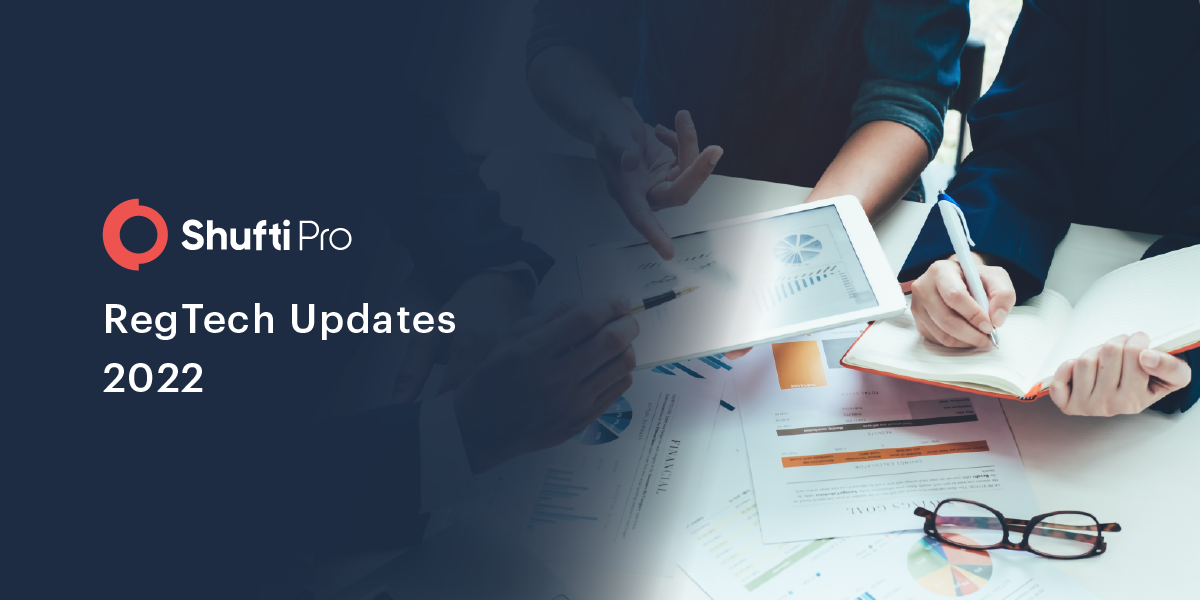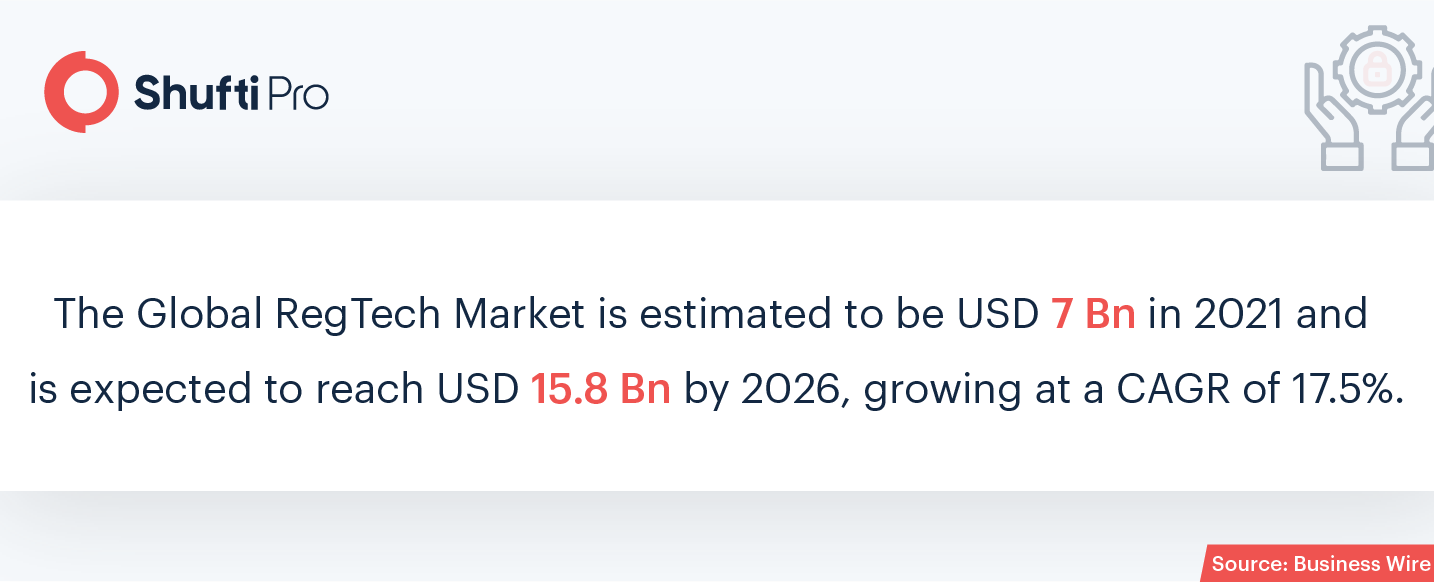A Brief Overview of the RegTech Industry [2022 Update]

The rising financial crimes have raised concerns of global regulatory watchdogs giving rise to RegTech. Businesses, in the digital world, are employing advanced technology for effective compliance with the changing regulatory landscape. Regtech not only cuts down the cost of the compliance processes but also enhances the quality to make procedures robust, reducing friction and the risk of compliance failures.
The Rise of RegTech
Banks and financial corporations experience continuously evolving regulatory challenges. In the drive to remain compliant with the regulatory obligations, financial institutions are turning towards tech-driven solutions to enhance their operations.
RegTech or Regulation Technology, a buzzword in the modern world, is a must-have for every financial institution, gambling platform, and cryptocurrency exchange. Thus RegTech has become an ideal solution for improving financial services, making transactions more transparent between counterparties. In most businesses, RegTech has become a crucial tool to carry out Customer Due Diligence (CDD) procedures.
However, due to advanced technologies and the increasing demand for digitization of financial services, banks are dealing with rigid regulatory compliance. Despite all the benefits of RegTech innovations, it assists banks to comply with compliance seamlessly.

Opportunities and Challenges For Regtech Industry in 2022
With the rising demand for digital financial services and increasing cases of crimes, several opportunities are emerging for the RegTech industry. Particularly, the industry can utilize big data, cloud computing, and machine learning algorithms to assist the heavily regulated businesses as well as regulatory bodies through the set of automated risk management systems, regulatory reporting solutions, and the operation of internal compliance procedures.
However, these opportunities are relevant to in-house solutions that are being established and integrated by large financial institutions. On the contrary, emerging opportunities come with various risks and challenges.
Interpretation of Regulation
Ensuring that the solution is based on “correct interpretation” of the suitable regulations, whether in the UK or any other nation, is the viable criteria. RegTech companies are proficient at developing a solution for real-life problems. However, identifying and coming up with the solution is not a piece of cake. Primarily, in a regulatory context where a set of standards and laws can have numerous interpretations.
Taking Responsibility
The solution involving AI and ML algorithms for decision-making is to be owned by the companies. For instance, the speed with which decisions are rendered can be beneficial for businesses. But what happens when something gets wrong? What if errors are generated due to robustness? Regtech firms incorporating advanced-technology algorithms must ensure that they have effective protection, for example, insurance policies, in case something goes wrong.
Data Protection
One of the viable challenges for the RegTech sector is data protection. The use of personally identifiable information is monitored by General Data Protection Regulation (GDPR). This governs the use of customers’ data and introduces rights for online data protection. Therefore, RegTech solution providers and their clients have to assure that they comply with data protection regulations. Some of the data analytics software uses customers’ data for better analysis. Thus, it’s the industry’s responsibility to ensure that data doesn’t fall into the wrong hands.
Integration of Advanced Technologies is Essential for Regtech’s Success
The recent survey conducted by Baker McKenzie revealed the rapid acceptance and growing understanding of advanced technologies. 49% of the respondents mentioned that they expect their firms or startups will start incorporating AI-powered systems within the next three years. Whereas, 29% expect that the RegTech companies will embed AI and other advanced technologies to develop solutions to counter financial crimes.
Conventional banks and financial organizations have to process immense data. To organize the existing data, and to meet regulatory requirements, banks need systems that can go beyond automated procedures. However, RegTech companies are using advanced technology algorithms to back decision-making. With this, solutions can classify customers, notifications, and make pre-risk assessments while staying compliant with Financial Instruments Directive (MiFID II) and General Data Protection Regulation (GDPR).
Commonwealth Bank of Australia (CBA) has used a Regtech pilot solution embedded with Natural Language Processing (NLP) and AI technologies. With the help of this software around 1.5 million text paragraphs in markets in financial instruments directive II (MiFID II) was converted into regulatory obligations. The conversion was rendered 95% accuracy and took two weeks to complete as against 24-weeks when done traditionally. CBA collaborated with Internationale Nederlanden Groep (ING) and Financial Conduct Authority (FCA) to accomplish this. This experiment portrayed the potential for the technology-powered regulatory framework.
Thereby, advanced technologies in RegTech solutions will develop an extra layer of security that businesses will rely upon. Data analytics, improved accuracy, alerts, and insights will enable firms to optimize resources allocated to regulatory compliance and can achieve positive outcomes.
Key Pillars of Regtech Regulatory Landscape
The term itself shows Regulation Technology, companies can’t interpret without discussing the laws that ensure a standard framework to overcome cybercrimes and make the financial sector’s digitization possible. Here are some of the major regulations:
-
- Anti-Money Laundering Derivative 6 (AMLD6): This regulation protects banks and financial institutions from money laundering and other financial crimes by screening clients during the onboarding procedures while monitoring their transactions to prevent illicit activities.
- General Data Protection Regulation (GDPR): This legislation regulates data protection and privacy for individuals within the European Union. Under this law, RegTech service providers are obliged to take measures to protect online data from breaches.
- Payment Service Directive 2 (PSD2): This regulation aims to increase competition in the payment industry, bringing new ways of payment services, improving client protection, and extending the reach of directives.
- SEPBLAC and BaFin: This is the Spanish Financial Intelligence Unit whose responsibility is to overcome the risk of money laundering and terrorist financing.
- Know Your Customer (KYC): This regulation allows companies to identify and verify the real identities of customers before getting them on board. This is an ideal way of distinguishing fraudsters and legitimate clients.
- Financial Action Task Force (FATF): FATF took an initiative in 2017 to regulate the Regtech and FinTech industries. Since then, the watchdog is working to establish guidelines and standards for regtech solutions to make this industry fraud-free.
Final Thoughts
The initial phase of the RegTech solution has focused on fraud prevention and regulatory compliance. As the key driver of this industry is AI, big data, and NLP, companies can expect solutions that can provide a higher level of analysis associated with risk and performance using existing information.
However, with the disruption in advanced technologies, the regtech industry will flourish in 2022. Just because these solutions are designed to help businesses to comply with regulations, doesn’t mean that they are immune to regulatory scrutiny. That being said, global regulators and financial firms are working together to develop this sector.
Learn more about RegTech and its need in your industry from the experts.

 Explore Now
Explore Now













